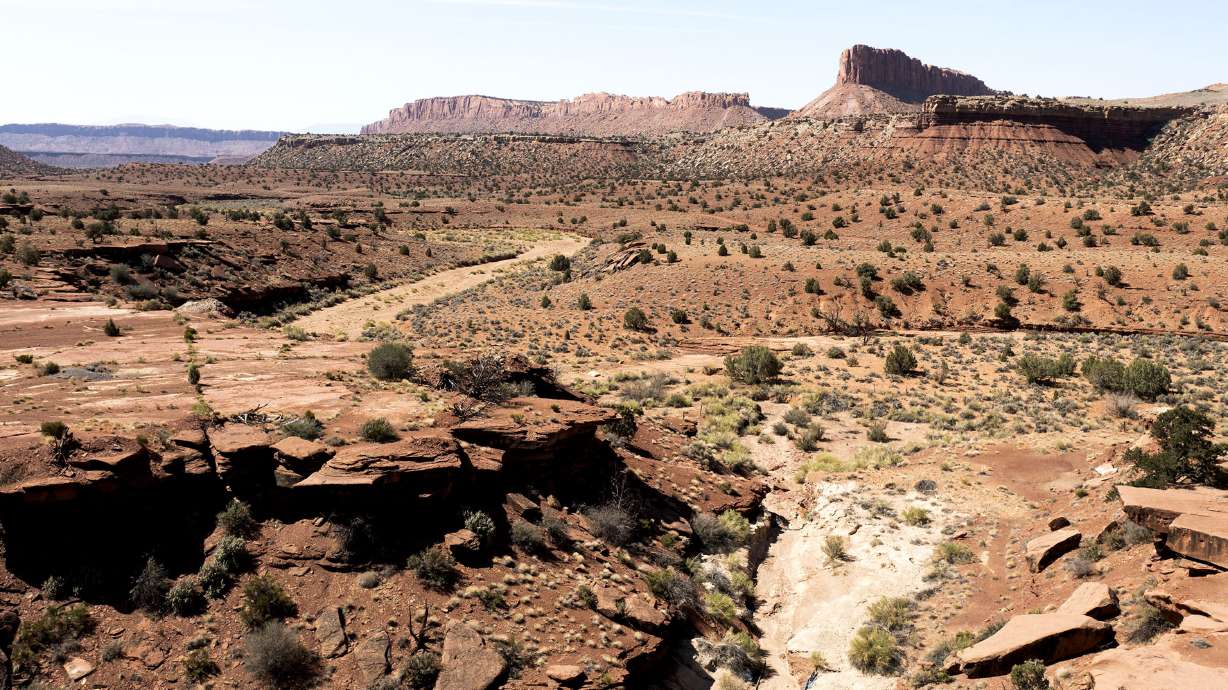Estimated read time: 4-5 minutes
This archived news story is available only for your personal, non-commercial use. Information in the story may be outdated or superseded by additional information. Reading or replaying the story in its archived form does not constitute a republication of the story.
SALT LAKE CITY — Twenty-nine law professors from around the country have submitted a brief to the 10th Circuit Court of Appeals, contributing arguments against the state of Utah's lawsuit challenging President Joe Biden's expansion of two national monuments in 2021.
The professors submitted their amicus curiae brief Jan. 16, a legal document offering relevant information or arguments to the court by parties not involved in the litigation. Their briefing says the Antiquities Act of 1906, also known as the National Monument Act, authorizing the president to create national monuments, has proven to be "one of the most important and enduring pieces of public land legislation in U.S. history."
The brief, submitted by Chris Winter from the University of Colorado Law School in Boulder, argues that "the case presents fundamental questions about the administration of the Antiquities Act," and it is out of the scope of the courts to address the arguments presented by the plaintiffs, Utah Gov. Spencer Cox, Utah Attorney General Sean Reyes, Garfield County and Kane County.
Reyes, in a press briefing on the appeal, said, "The state of Utah has sought appropriate safeguards for the precious, unique area in the heart of Bears Ears and Grand Staircase-Escalante regions. But the current designations don't just protect objects and artifacts as intended by the Antiquities Act. They lock up millions of other acres of landscapes, vistas and similarly vague concepts never contemplated by the act."
The law professors recommend that the appeals court dismiss the state's lawsuit, arguing it is outside the scope of the courts in this case to conduct an in-depth factual review of the president's actions. It instead must be handled by Congress, they argue.
Background
The National Monument Act, when passed in 1906, delegated some authority of Congress to the president in the formation of national monuments. Congress, not the courts, became the backstop for this executive power, because it retained the ability to alter or vote on the presidential action.
In 1996, President Bill Clinton created the Grand Staircase-Escalante National Monument, a 1.7 million acre area of land. President Barack Obama created Bears Ears National Monument in 2016, consisting of approximately 1.35 million acres.
President Donald Trump reduced the size of both monuments by 1.96 million acres in 2017. The remaining reservations, at a combined 1.11 million acres, became tied up in litigation as soon as the proclamation went forward, as many parties — including five Native American tribes, the Natural Resources Defense Council, the Southern Utah Wilderness Alliance and Patagonia — filed separate lawsuits challenging the president's authority "to dismantle national monuments" under the Antiquities Act.
These suits were still pending when Biden took office, and expanded the two national monuments in question to a combined 3.23 million acres of land. The suits were never resolved, and remain in limbo.
The state of Utah, and the counties of Garfield and Kane, filed a lawsuit to challenge Biden's action.
In the complaint, the plaintiffs state "the reservations shut down local jobs," attracted tourists from all over the world who were responsible for "damage to the land, harm to animals, and desecration of archaeological sites."
A main element of the state's argument is that the monuments are much larger than what is allowed in the Antiquities Act, which specifies "the limits of which in all cases shall be confined to the smallest area compatible with the proper care and management of the objects to be protected."
Reyes said, "President Biden's designations are as large as several states — which far exceeds his authority and is an abuse of the act." According to the lawsuit, the combined acreage of the two monuments is as large as Delaware, and "larger than 20% of all the nations in the world."
Case dismissed
U.S. District Judge David Nuffer dismissed the lawsuit in August 2023, writing that Biden expanding the national monuments "is not an action reviewable by the court."
Reyes filed an appeal, saying, "We eagerly anticipate explaining to the 10th Circuit why this is yet another example of federal overreach and how the law and facts favor more reasonable-sized monuments."
But the newest input by the law professors claims that the appeals court should also dismiss the lawsuit, but after "a limited facial review of the monument proclamations," which maintains the ability of the courts to participate in the creation of monuments on a surface level. The ruling of the appellate court may have some impact on the pending lawsuits against Trump's actions, allowing the courts to decide whether or not the president is given the ability to shrink monuments in the Antiquities Act.
Winter said it's important to "maintain the uniformity across courts" in the handling of these types of lawsuits.









